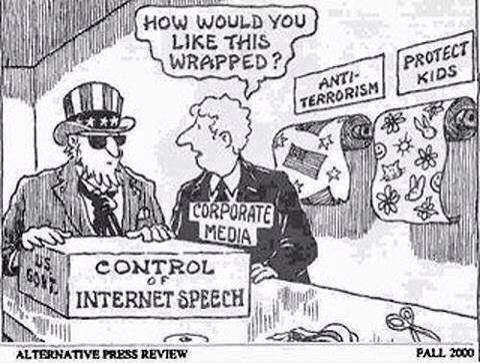When the government rolled out the Great Firewall of Cameron – the nickname given to the porn filters now provided as default by most residential broadband providers in the UK – they asked us to think of the children. Think of the shattered lives we can save by blocking child pornography, they said. And who would argue against that intention? Not the ISPs, certainly.
But like all major changes which forego public scrutiny, the filters are now stepping beyond their original remit, seeping into parts of the internet that shouldn’t be of governmental concern. According to comments made recently by James Brokenshire, the minister for immigration and security (a somewhat inflammatory departmental conflation), the Counter Terrorism Internet Referral Unit (CTIRU) have been spending much of their time flagging “unsavoury” content on sites such as YouTube, in an effort to avert the “radicalisation of individuals.”
In the interest of full disclosure, I will point out that CTIRU has been performing this public service – the flagging of what Brokenshire refers to as “unsavoury” material – since at least 2010, and has in fact flagged 29,000 videos since February of that year. However, with the new filters for explicit material already set as default for most UK households thanks to pressure on private companies, and Brokenshire calling for further government interference in restricting online content, it seems only sensible to have concerns over the future of these restrictive practices.
By one branch of government, we’ve been told it’s for child safety; by another, we’re told it’s a counter-terrorism effort. The fact is, if the government is so keen on the idea of persistent online censorship it’s willing to wrap the package twice, we should be worried.
Let’s be clear about something else here: we’re not talking about illegal content, or even arguing about what legal restraints should or should not be placed on online content. Brokenshire’s proposal for extended restrictions, in his own words, would be applied to content “that may not be illegal but certainly is unsavoury and may not be the sort of material that people would want to see or receive.”
And I’m sure the British population is just thrilled that the minister has deemed himself fit to make that decision on their behalf.
As Danny O’Brien from the Electronic Frontier Foundation says aptly, “politicians have proved to be terrible arbiters of taste. If you don’t think much of their suits and haircuts, you’re not going to think much of what they think acceptable or unsavoury for public consumption.”
This is another unfortunate mask censorship often wears: that of the bumbling do-gooder trying to sanitise the world and make it seem like a much nicer place. Unfortunately, whilst this tactic might work fantastically for your eight-year-old – keeping the magic of childhood alive – when applied to a population of adults, all it does it attempt to curb rogue behaviour, or (arguably the most disturbing word Brokenshire has used), “radicalism.”
Being politically radical is not the same as being violent; Hitler might have been a radical, but so was Ghandi. Radicalism in politics can mean many things. It can mean chaining yourself to railings to get votes for women, or taking a machete to a soldier in the street. It can be the biggest push for change, whether towards a progressive vision of the future or a draconian era of surveillance and the curtailing of civil liberties. What it isn’t, however, is intrinsically threatening, which is why there is no just cause to censor politically radical content on the internet – especially when the mainstream is supporting censorship.
